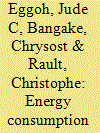|
|
|
Sort Order |
|
|
|
Items / Page
|
|
|
|
|
|
|
| Srl | Item |
| 1 |
ID:
110433


|
|
|
|
|
| Publication |
2011.
|
| Summary/Abstract |
The aim of this paper is to provide new empirical evidence on the relationship between energy consumption and economic growth for 21 African countries over the period from 1970 to 2006, using recently developed panel cointegration and causality tests. The countries are divided into two groups: net energy importers and net energy exporters. It is found that there exists a long-run equilibrium relationship between energy consumption, real GDP, prices, labor and capital for each group of countries as well as for the whole set of countries. This result is robust to possible cross-country dependence and still holds when allowing for multiple endogenous structural breaks, which can differ among countries. Furthermore, we find that decreasing energy consumption decreases growth and vice versa, and that increasing energy consumption increases growth, and vice versa, and that this applies for both energy exporters and importers. Finally, there is a marked difference in the cointegration relationship when country groups are considered.
|
|
|
|
|
|
|
|
|
|
|
|
|
|
|
|
| 2 |
ID:
113445


|
|
|
|
|
| Publication |
2012.
|
| Summary/Abstract |
This article extends the recent findings of Liu (2005), Ang (2007), Apergis et al. (2009) and Payne (2010) by implementing recent bootstrap panel unit root tests and cointegration techniques to investigate the relationship between carbon dioxide emissions, energy consumption, and real GDP for 12 Middle East and North African Countries (MENA) over the period 1981-2005. Our results show that in the long-run energy consumption has a positive significant impact on CO2 emissions. More interestingly, we show that real GDP exhibits a quadratic relationship with CO2 emissions for the region as a whole. However, although the estimated long-run coefficients of income and its square satisfy the EKC hypothesis in most studied countries, the turning points are very low in some cases and very high in other cases, hence providing poor evidence in support of the EKC hypothesis. CO2 emission reductions per capita have been achieved in the MENA region, even while the region exhibited economic growth over the period 1981-2005. The econometric relationships derived in this paper suggest that future reductions in CO2 emissions per capita might be achieved at the same time as GDP per capita in the MENA region continues to grow.
|
|
|
|
|
|
|
|
|
|
|
|
|
|
|
|
| 3 |
ID:
132636


|
|
|
|
|
| Publication |
2014.
|
| Summary/Abstract |
In recent years, sustainability has represented one of the most important policy goals explored in the environmental Kuznets curve (EKC) literature. But related hypotheses, performance measures and results continue to present a challenge. The present paper contributes to this ongoing literature by studying two different EKC specifications for 10 Middle East and North African (MENA) countries over the period 1990-2010 using panel data methods. For the first specification, namely EKC, we show that there is an inverted U-shape relationship between environmental degradation and income; while for the second specification, namely modified EKC (MEKC), we show that there is an inverted U-shape relationship between sustainability and human development (HD). The relationships are shaped by other factors such as energy, trade, manufacture added value and the role of law. More interestingly, findings from the estimation show that EKC hypothesis, HD and sustainability are crucial to build effective environmental policies.
|
|
|
|
|
|
|
|
|
|
|
|
|
|
|
|
|
|
|
|
|